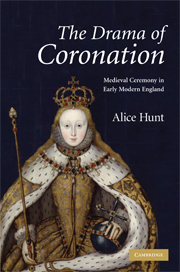Book contents
- Frontmatter
- Contents
- Preface
- Note on style and dates
- List of abbreviations
- Introduction: the ‘idol’ ceremony of coronation
- Chapter 1 Why crown a king? Henry VIII and the medieval coronation
- Chapter 2 ‘Come my love thou shalbe crowned’: the drama of Anne Boleyn's coronation
- Chapter 3 ‘But a ceremony’: Edward VI's reformed coronation and John Bale's King Johan
- Chapter 4 ‘He hath sent Marye our soveraigne and Quene’: England's first queen and Respublica
- Chapter 5 ‘A stage wherin was shewed the wonderfull spectacle’: representing Elizabeth I's coronation
- Epilogue: ‘Presume not that I am the thing I was’
- Notes
- Bibliography
- Index
Introduction: the ‘idol’ ceremony of coronation
Published online by Cambridge University Press: 22 September 2009
- Frontmatter
- Contents
- Preface
- Note on style and dates
- List of abbreviations
- Introduction: the ‘idol’ ceremony of coronation
- Chapter 1 Why crown a king? Henry VIII and the medieval coronation
- Chapter 2 ‘Come my love thou shalbe crowned’: the drama of Anne Boleyn's coronation
- Chapter 3 ‘But a ceremony’: Edward VI's reformed coronation and John Bale's King Johan
- Chapter 4 ‘He hath sent Marye our soveraigne and Quene’: England's first queen and Respublica
- Chapter 5 ‘A stage wherin was shewed the wonderfull spectacle’: representing Elizabeth I's coronation
- Epilogue: ‘Presume not that I am the thing I was’
- Notes
- Bibliography
- Index
Summary
In Shakespeare's King Henry V, Henry puzzles over the purpose of royal ceremony. Addressing ceremony as if it were a separate being and uncertain god, he imploringly asks, ‘And what art thou, thou idol ceremony?’ His question plays on the words ‘idol’ and ‘idle’, on the distinction between false and meaningful worship and on ceremony's simultaneous awe and poison. Even as Henry invokes ceremony as proud, unhealthy, unhappily futile, he also grants it power through the plenitude and urgency of his language: ceremony is ‘adoration’, ‘thrice-gorgeous’, vital and inevitable: it is ‘the tide of pomp / That beats upon the high shore of this world’ (iv. 1. 242, 263, 261–2).
This book asks ‘what art thou?’ of the coronation ceremony in the sixteenth century, the moment when the ‘balm, the sceptre and the ball, / The sword, the mace, the crown imperial, / The intertissued robe of gold and pearl’ (iv. 1. 257–9) were consecrated and bestowed on the new monarch, transforming the rightful heir into divine ruler. Unusually, a total of five coronations – those of Henry VIII, Anne Boleyn, Edward VI, Mary Tudor and Elizabeth I – took place between 1509 and 1559, years during which England underwent a series of profound changes. The relationships between ceremony and religious reformation, and between ceremony and monarchical power, were increasingly contested during this period, and this book presents a new understanding of the survival of the ‘idol’ ceremony of coronation and its role in early modern English culture.
- Type
- Chapter
- Information
- The Drama of CoronationMedieval Ceremony in Early Modern England, pp. 1 - 11Publisher: Cambridge University PressPrint publication year: 2008



